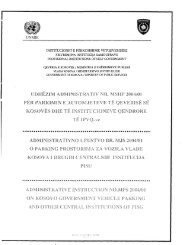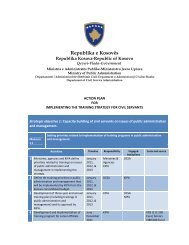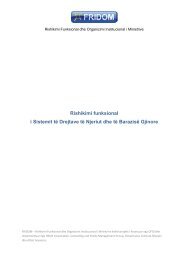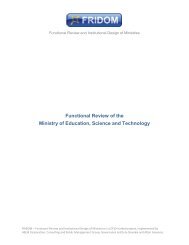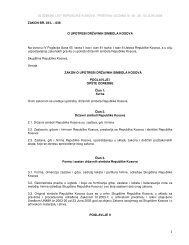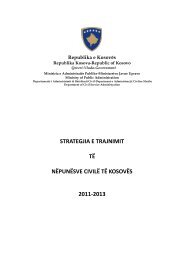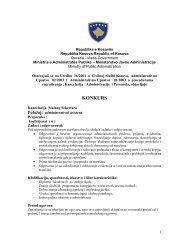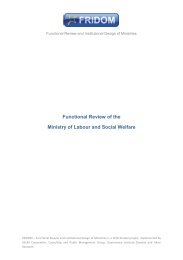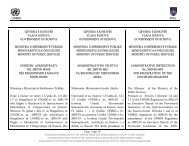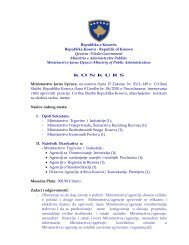Functional Review of the Ministry of Environment and Spatial Planning
Functional Review of the Ministry of Environment and Spatial Planning
Functional Review of the Ministry of Environment and Spatial Planning
You also want an ePaper? Increase the reach of your titles
YUMPU automatically turns print PDFs into web optimized ePapers that Google loves.
horizontal communication <strong>and</strong> brings <strong>the</strong> immense problem in <strong>the</strong> strategic planning <strong>and</strong> coordination but<br />
also leads to separate capacities for each department that include such horizontal functions as policy <strong>and</strong><br />
law drafting, resp. monitoring <strong>of</strong> environmental media.<br />
It is widely known that a multidisciplinary sector requires an enormous effort <strong>of</strong> strategic planning <strong>and</strong><br />
coordination. Without due coordinating mechanisms, <strong>the</strong> administrative system for environment <strong>and</strong><br />
spatial planning cannot function effectively. Unfortunately, <strong>the</strong> effective horizontal communication <strong>and</strong> topbottom<br />
planning approach are still missing.<br />
The cost <strong>of</strong> <strong>the</strong>se unnecessary units is in <strong>the</strong> management cost <strong>of</strong> coordinating <strong>the</strong> very high number <strong>of</strong><br />
units, in limiting flexibility in <strong>the</strong> use <strong>of</strong> human resources <strong>and</strong> in reinforcing <strong>the</strong> “silo” mentality <strong>of</strong> civil<br />
servants where <strong>the</strong>y see only narrow horizons <strong>of</strong> <strong>the</strong>ir very small units.<br />
Recommendation II.1: decrease <strong>the</strong> number <strong>of</strong> units at all levels <strong>and</strong> remove incentives to create<br />
superfluous units by: i) explicitly stating that departments do not need to have divisions to exist as<br />
departments; ii) abolishing sectors except for divisions larger than a certain number (10 is recommended).<br />
II. 2 Integrating small units<br />
Some <strong>of</strong> <strong>the</strong> support functions are fractured across MESP. Primary c<strong>and</strong>idates for a merger are some <strong>of</strong><br />
<strong>the</strong> administrative tasks <strong>of</strong> <strong>the</strong> central MESP. Functions like HR management, procurement, internal audit,<br />
etc. have a relatively small number <strong>of</strong> employees <strong>and</strong> administrative transactions (e.g. procurement). With<br />
merging <strong>the</strong>se non-core functions <strong>of</strong> central MESP into <strong>the</strong> Central Administration Department (CAD), one<br />
can expect savings through improved economies <strong>of</strong> scale.<br />
An integration <strong>of</strong> <strong>the</strong> Office for gender equality, human <strong>and</strong> minority rights into <strong>the</strong> Central Administration<br />
Department should be considered. There might be a dispute about its independence; however,<br />
independence can be achieved through managerial subordination. This can be achieved by limiting<br />
personal <strong>and</strong> financial decision making freedom <strong>of</strong> <strong>the</strong> director <strong>of</strong> CAD toward this <strong>of</strong>fice.<br />
A general consensus has been reached in <strong>the</strong> FRIDOM Project team that <strong>the</strong> EU Integration Office <strong>and</strong><br />
<strong>the</strong> Information <strong>and</strong> Public Relation Office should keep <strong>the</strong>ir independence, despite <strong>the</strong>ir limited number <strong>of</strong><br />
staff. This decision can be supported by <strong>the</strong> ever increasing importance <strong>of</strong> <strong>the</strong> EU Integration Office which,<br />
probably, in <strong>the</strong> short-term period will face an enormous challenge <strong>of</strong> EU accession process, as well as<br />
<strong>the</strong> need for coordination <strong>of</strong> <strong>the</strong> EU related activities across <strong>the</strong> whole government.<br />
Overall policy coordination is an important task that has not been addressed properly in MESP. Technical<br />
departments develop <strong>the</strong>ir intrinsic policies but <strong>the</strong>re is limited capacity to analyze <strong>the</strong>m with an<br />
environmental multi-disciplinary approach, transfer <strong>the</strong>se policies into work plans <strong>and</strong> monitor on a regular<br />
basis <strong>the</strong> implementation process. Fur<strong>the</strong>rmore, <strong>the</strong>re is little or no capacity to co-ordinate among different<br />
government planning documents (MTEF, EPAP, KEAP etc.) <strong>and</strong> <strong>Ministry</strong> yearly work plans.<br />
The sEU Integration Office is in charge <strong>of</strong> coordinating <strong>the</strong> European integration issues as <strong>the</strong>y relate to<br />
<strong>the</strong> MESP. This job mainly consists <strong>of</strong> working with <strong>the</strong> Agency for Coordination, Development <strong>and</strong><br />
European Integration (ACDEI) providing input <strong>and</strong> following <strong>the</strong> implementation <strong>of</strong> <strong>the</strong> European<br />
Partnership Action Plan (EPAP). Considering that <strong>the</strong> EPAP <strong>and</strong> <strong>the</strong> whole European agenda will continue<br />
to dominate <strong>the</strong> policy discourse in <strong>the</strong> near future, <strong>the</strong> EU Integration Office scope could be broadened to<br />
include general policy coordination issues as well. It should be noted that this would not include technical<br />
level details <strong>of</strong> <strong>the</strong> policy initiatives which would remain under coordination by particular technical<br />
departments.<br />
The EU Integration <strong>and</strong> Policy Coordination Office would be responsible for <strong>the</strong> following main functions:<br />
Leading development <strong>and</strong> holding responsibility for coordination <strong>of</strong> implementation <strong>of</strong> <strong>the</strong> ministry’s<br />
main strategic <strong>and</strong> business planning documents such as MTEF (priority <strong>and</strong> policy part), EPAP,<br />
KEAP <strong>and</strong> annual work plan;<br />
Being <strong>the</strong> focal point for <strong>the</strong> centre <strong>of</strong> government <strong>and</strong> o<strong>the</strong>r horizontal ministries, namely, <strong>the</strong> Office <strong>of</strong><br />
Prime Minister, <strong>the</strong> <strong>Ministry</strong> <strong>of</strong> Finance <strong>and</strong> Economy, <strong>and</strong> <strong>the</strong> <strong>Ministry</strong> <strong>of</strong> Agriculture, Forestry <strong>and</strong><br />
Rural Development;<br />
13



